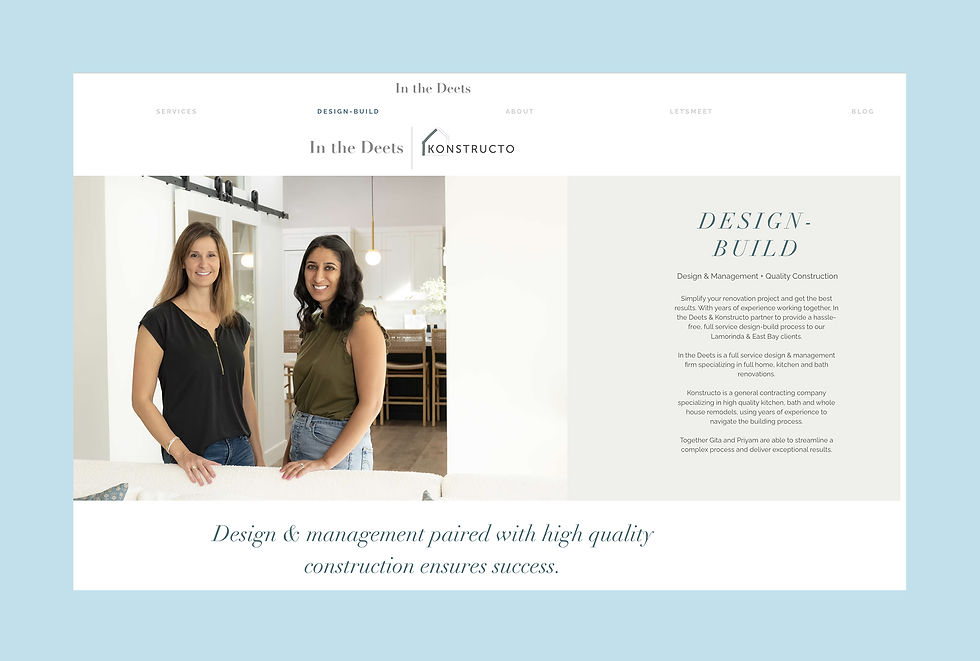- Joe O'Connor

- Jul 25
- 9 min read
Updated: Jul 28
Start generating business ideas with the Wix Business Launcher →

When Gita Jacobson stepped in to save her home renovation from potential ruin, little did she know it would inspire her to start a business.
She had hired a designer who sold her “a grand vision,” but when she got quotes from construction companies based on the plans, they were all way over budget. “We had to scale back our work, and the contractor we ended up being able to afford just didn't know how to work with a designer,” she says.
The project began to spiral, which is when Gita jumped in. Tapping into her industrial design background, she made herself the middle person between contractor and designer, overseeing the plans and making sure everything clicked.
Want to learn how to make a business website? Choose Wix as your website builder and get started today.

A move that paid off
The project itself was a whirlwind, but Gita’s hard efforts paid off. Seeing her friends drool over the results got her thinking that maybe she had a knack for this.
“That's when I started to come up with a plan for In the Deets,” she says. “My design background is technical—I understand how things are built. But I was scared to leave my corporate job, so I decided to do both at the same time and see if my idea would resonate with the market.”
Gita admits she didn’t know much about how to start a construction business or how to create a construction business plan, so she spent time interviewing those who did. “I was fortunate to find a contractor and architect who were awesome and taught me the ropes,” she says.
With more practical knowledge and a personal project under her belt, Gita set her sights on her next challenge: designing a business website.
A different kind of build
Gita started with research. She tested out the best construction website builders, choosing Wix because “it seemed easy to work with, and the website templates were very high-end looking.” She also liked that she didn't need to know how to code—she could just drag and drop elements and get creative.
As Gita saw it, too many construction sites were “full of fluff” and looked dated, so she prioritized high-res photography, compelling copy and an elegant, organized layout on her own site. She also decided to create a blog sharing tips to those considering a renovation and using SEO features to drive traffic to the site.
Gita took website design inspiration from interior design brands like Studio McGee and Amber Interiors, as well as some of the best construction websites like Killowen Construction. “Design websites focus on large, beautiful images, whereas construction websites focus on the build process,” says Gita. “My goal was to merge those two ideas into one website.”
As for construction business name ideas, Gita focused on what she believed was her company’s core strength: attention to detail. “In the Deets came from my belief that you really need to focus on the details to get a renovation done right,” she says. “And that's what was going wrong on our project. No one really cared about the details.”
Whether she was redesigning her website or a client’s home, Gita would make sure no stone was left unturned.
As soon as her site went live, the messages started rolling in. In the Deets was officially open for business.
Explore free construction website templates:

The make-or-break moment
Gita describes quitting her corporate job and going all in on In the Deets as the biggest make-or-break moment of her life. It took her six months to take the leap. “Everyone told me I was crazy, including my boss at the time,” she says. “I figured in the worst case scenario, I would get a normal job again.”
That day has yet to come. And while Gita says learning how to navigate the ups and downs of becoming an entrepreneur and working with clients took time, she was determined to stick with it.
“The better I got at both, the fewer headaches I faced,” she says. “Having confidence and knowing that I’m providing a superior service has helped me stay focused and not get discouraged. There are always going to be bumps along the road, and most of them aren’t do or die—no matter what the client thinks.”
Ten years later, In the Deets is thriving. The company has successfully completed over 150 design-build projects for clients in California and, in the coming months, will launch its own wood floor line catered to families.
Gita has also partnered with Priyam Sawhney, a general contractor with Konstructo, to make sure she has all angles covered for remodels, additions and new constructions.
By all accounts, it’s a perfect match—two mompreneurs who know they can take on any project given what they can manage at home. “Managing a build is nothing compared to our kids’ carpool schedules,” jokes Gita.

What makes it all worthwhile
Gita took a longer route than most to discover her career calling, but has no regrets about how she got there. “I did exactly what I wanted,” she says. “I focused on good, quality work.”
Of course, the construction business isn’t all snug fits and smooth finishes. According to Gita, during the build, you can get so bogged down making tiny adjustments that you lose sight of the bigger picture. But, as soon as she sees the look on a client’s face when a project is complete, that’s all forgotten.
“Helping clients build their dream homes is extremely rewarding,” she says. “When you see how excited and happy they are to live in their home, it makes all the work worthwhile. Many of our clients become friends through the process, and seeing their family photos and videos enjoying their home is special.”
Lessons from Gita on how to start a construction business
Gita says she was fortunate to find a contractor who shared 30 years of industry and entrepreneurship experience with her, including project management methods she still uses today.
Here, she pays it forward, providing five tips for anyone starting their own construction business:
Pro tip | What Gita says | Real-life example |
Start with lower-tier work | “If you have no experience, don't expect to work with high-end clients. There's nothing wrong with doing builder-grade work until you figure things out.” | Take on small kitchen remodels and rental property renovations before bidding on custom home builds. |
Build the right team | “Make sure you have the right team around you. Don't sub everything out, you'll lose quality and your prices will be higher.” | Hire a trusted full-time carpenter and project manager to ensure consistency and reduce costly rework. |
Choose a designer who sticks around | Partner with a stellar designer who doesn't just hand over designs but stays integrated in the construction process.” | Team up with an interior designer who attends site visits and collaborates mid-project, so you’re always on the same page. |
Be picky with clients | “My biggest regret is taking on crappy clients who spoke down to me, didn't listen to me and devalued my contributions. I have a hard rule to never work with ‘A-holes.’” | Use a vetting process that includes discovery calls and clear contracts to filter out red flags early. |
Learn from every project | “What I like best about construction and design is that with each project, I learn something new. Every house is different. You never get bored.” | Keep a project journal to document lessons learned—like unexpected permit issues or new insulation techniques—to help refine future projects. |
Four tips to cement your online presence
Anyone interested in understanding how to make a construction website can take plenty of lessons from In the Deets. Here, Gita shares five top tips:
Make your copy meaningful
Gita believes that too many construction sites are stuffed with irrelevant, space-filling text. Every word on the In the Deets website has purpose—whether that’s outlining the company’s construction process or sharing the human story behind the business. (For inspo on creating meaningful micro content, check out 31 construction slogans that hammer home your message.)
Discover how to start a blog in 10 simple steps.
Go high-res for imagery
The In The Deets website features a clean, professional design with ample white space that allows striking interior design imagery to breathe. “I try not to do anything overly fancy and let the pictures and the work speak for itself,” says Gita. (Related: How to make a construction logo)
Create a unique construction design logo in minutes with Wix Logo Maker.
Keep things fresh
When operating in an industry where trends dictate your offering, it’s important to stay ahead of the curve. Gita typically updates her website once a year. “I'm always looking for ideas and inspiration as I browse the web,” she says. “A website should be an ever-evolving content machine. It's not a one-and-done thing.”
Optimize for mobile
According to Wix Analytics data on In the Deets, most website visitors browse via mobile. “I wasn't expecting that because I wanted visitors to see these large, beautiful images,” says Gita. “I’ve worked a lot on the mobile version to make sure it looks just as nice as the desktop.” (Related: 6 concrete construction marketing tactics to lay the foundation for success)
Starting a construction business FAQ
What is the best way to start a construction company?
The following steps will help you build a solid foundation for your construction business:
Conduct market research: A deep dive into the market will help you identify your niche, demand in your area and who your competitors are.
Write a business plan: This document will outline your business concept, services, target market, competition, marketing strategy, financial projections and operational structure. It will also guide your business decisions and be important when looking for loans or investors.
Register your business: Choose an appropriate business structure (such as sole proprietorship, limited company, partnership) when registering your business and get the required licenses and permits. In some regions, special registrations like the Construction Industry Scheme (CIS) may be needed for tax and legal compliance.
Secure funding: Unless you already have the funds, you’ll need cash to cover startup costs like equipment, labor and marketing. Funding options include personal savings, bank loans, investors or crowdfunding, all of which will be detailed in your financial plan.
Market your construction business effectively by creating a website, networking with suppliers and subcontractors and using social media. You can also build your reputation early on by doing quality work for initial clients or in the community.
Build your team: Hire skilled employees and subcontractors who are experienced, licensed and reliable. Establish clear hiring processes and contracts to ensure professionalism and quality.
Get the right tools: Purchase or hire the equipment relevant to your construction specialty based on your budget and business plan.
Build your tech: Implement systems and technology such as construction management software to help manage scheduling, payroll, project tracking and compliance with safety regulations.
What are the biggest challenges to starting a construction business?
Like any sector, starting a construction business comes with challenges. Here are some you might encounter:
Cash flow management: Construction projects often have delayed payments, but regular expenses like wages, materials, and subcontractors need timely funding. Managing cash flow effectively will prevent your construction business starting in the red.
High startup costs: Starting a construction company requires significant capital for equipment, physical space, insurance and hiring. Underestimating these costs can cause early financial difficulties or bankruptcy.
Skill shortages: The construction industry in many parts of the world faces a shortage of skilled labor and an aging workforce. Finding and retaining qualified workers is a persistent problem.
Cost overruns: Projects often exceed their budgets due to poor estimation, design changes or unexpected expenses. Effective planning and monitoring of budgets are your best friend here.
Project delays: Factors like weather, material shortages, regulatory hurdles and subcontractor reliability can delay projects, which can negatively impact your profitability and reputation.
Regulatory compliance: Keeping up with changing safety regulations, permits and maintaining accurate documentation requires constant attention. Make sure you’re up to speed.
Technology adoption: If you’re slow to adopt new technologies, you’re most likely falling behind competitors in how you project manage, schedule and communicate.
Safety concerns: Construction is a high-risk industry with a high rate of workplace injuries and fatalities. Ensuring consistent safety protocols is the best way to keep your staff and clients safe.
Blame culture: Miscommunication between contractors, clients and subcontractors can cause disputes and delays. Over-communicating is one best practice to avoid the dreaded blame game.
What is the fastest growing sector in construction?
The fastest growing sector in construction currently is logistics and warehousing construction. This trend is driven by the rapid growth of eCommerce, which increases demand for large-scale distribution hubs and purpose-built logistics parks.
Closely following are sectors related to renewable energy and sustainable materials, including solar, hydrogen, and green building materials, which are expanding rapidly due to net-zero and sustainability pressures.
Residential new-builds and build-to-rent housing markets are also major growth areas supported by government investment and planning reforms.
Globally, civil engineering infrastructure projects are projected to be the fastest growing sector over the next 15 years, fueled by greater investment in infrastructure.
What type of construction business is most profitable?
The most profitable types of construction business in 2025 are generally those that combine high demand, scalability, premium pricing and efficiency. Leading profitable sectors include:
General contracting and project management: This construction business oversees entire projects and generates consistent, substantial income from large contracts due to managing multiple subcontractors and complex projects.
Real estate development and property flipping: Buying, renovating, and reselling properties can offer some of the highest returns, particularly in high-growth markets.
Green construction and sustainable building: This niche industry focused on energy-efficient buildings, solar installations and sustainable materials is in high demand, benefits from government tax incentives and comes with premium pricing.
Prefab and modular construction: This type of construction has more favorable costs and construction time, allowing providers greater efficiency and scalability.
Residential construction: There’s no shortage of demand, volume and repeat business here, making residential building one of the most reliable profit centers.
Commercial construction: Although more complex than residential, constructing commercial office buildings, retail and industrial facilities delivers steady profits.
Roofing, HVAC, plumbing and electrical services: These trade services have consistent demand and produce strong margins. They’re also recession-proof because they relate to building maintenance and renovations.
Smart home and IoT installations: This is an emerging, high-margin niche that combines technology with construction for modern homes and retrofits.



Comentários